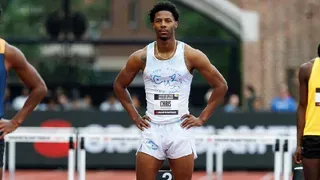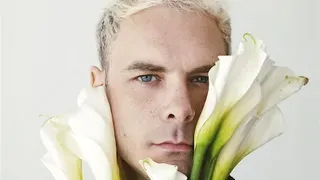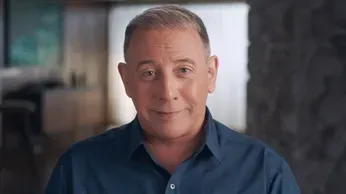
May 21
Ego and Alter-Ego: Director Matt Wolf Untangles the Story of Paul Reubens in the HBO Doc 'Pee-wee As Himself'
Kilian Melloy READ TIME: 10 MIN.
Paul Reubens – a.k.a. Pee-wee Herman – wanted "to set the record straight on a couple of things," and to that end he sat down with documentary filmmaker Matt Wolf for 40 hours of interviews before his death in 2023 after living for years with cancer... a fact he didn't share with the outside world, much as he kept the truth about being gay to himself during his five-decade career as an entertainer.
There was a time in Reubens' life when he was out, sort of, and happily partnered. But he gave that up: As Reubens tells Wolf in the documentary, he willingly embraced a life without long-term romantic relationships, though with decades-long connections to an assistant and a bodyguard. (A happy late-life coda found him lovingly partnered.)
But was living so deeply buried in a closet of his own careful devising a heartbreak for Reubens, or simply one more sacrifice willingly made in his quest for artistic accomplishment and fame? After all, Reubens started chasing stardom in the 1970s, performing with The Groundlings and narrowly missing out on joining the inaugural cast of "Saturday Night Live." By the time he discovered the breakout comedic persona of Pee-wee Herman in a stage show, and then turned that show into the legendary Saturday morning kids' show "Pee-wee's Playhouse," it was the early 1980s, the gay rights struggle and the AIDS epidemic were only a few years from raging in tandem, and the idea that queer people were somehow liable to assault, endanger, or mysteriously contaminate children was pushed with relentless zeal by homophobic forces (rather like today, in fact).
Reubens was an intensely private person, and also a driven entertainer. Perhaps not coincidentally, he was also – as Wolf put it in a recent press conference – "an archivist" who kept Super 8 film, VHS tapes, and other recordings "in a temperature-controlled bedroom." By the time Wolf began making the documentary, Reubens had amassed a tremendous trove of material documenting and illustrating the trajectory of his career.
He also hoarded collectibles of every sort. You can't help flashing on "Citizen Kane" when you see the vast assemblage he accumulated of every kind of tchotchke and knick-knack imaginable. Among Reubens' treasures was an archive of vintage homoerotic magazines, a cache of queer history that eventually got Reubens in legal trouble when, in 2002, he was reported as having child pornography and was subsequently prosecuted for possession of "obscene material" despite there being not a shred of evidence for the accusation. (This was separate from, and after, his 1991 arrest for allegedly masturbating in a porn theater.)
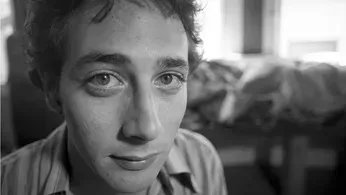
Source: HBO/Pee-wee Herman Productions, Inc.
It's no wonder, then, that at the start of Wolf's two-part documentary "Pee-wee As Himself" (premiering Friday on HBO), Reubens is complaining – in a gentle-sounding, half-winking, and yet deadly serious way – about not being directing the doc himself.
"My first meeting with Paul, it was clear that there could be a power struggle," Wolf recalled at the May 10 presser. "And it was a lot of talking and processing to get Paul to sit into that interview chair. And once he did, I anticipated it would be a pretty epic conversation."
Epic indeed, in hours as well as anecdotes; in an abundance of details; and in the struggle for who, exactly, was going to tell Reubens' story. Again and again in the course of the documentary we see him teasingly offer opinions or insights that he half-withholds in an "I'm only kidding, but am I only kidding?" way.
Wolf recalled that "when Paul sat down, he was very rebellious and slippery. He wouldn't follow my lead with any questions. He wanted snacks, pretzels, lollipops. He would make funny facial expressions, and it was a competitive dynamic.... he was sort of rebelling, procrastinating, giving me a hard time."
Wolf started having doubts, but producer Emma Tillinger Koskoff had none at all, telling Wolf that what he was capturing in the interviews – Reubens' teasing, his pushing back and testing as well as his sometimes startlingly revelatory disclosure – was "great" material.
"And it occurred to me then that this is who Paul is, this is portraiture," Wolf recollected.
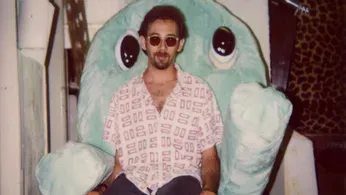
Source: HBO/Pee-wee Herman Productions, Inc.
Tillinger Koskoff wasn't wrong: The doc is a scintillating portrait of an artist so invested in the personae he created, and in the conviction of his proper destiny, that the character of Pee-wee Herman is filled out the way the lines of a performer's hand might become visible under the cloth of a puppet. Suddenly, moments that only the most discerning, gay-oriented eye would have picked up on leap out.
Wolf reckoned that, "looking back now, I recognize that that show created a space for a certain kind of radical acceptance where creativity thrives. And, you know, as a gay filmmaker, I also recognize things like Pee-wee Herman marrying a bowl of fruit salad at a slumber party or dancing in high heels to the song 'Fever.' That stuff spoke to me."
They were also extensions of who Reubens was and had been all his life. As the Pee-wee Herman performer told the filmmaker of his college days at the California Institute for the Arts (where his classmates included David Hasselhoff "Married With Children" star Katey Sagal), "if you saw me sitting in the dorm at two in the morning in drag, just hanging out, you might think I was a drag queen. And you could be right."
Following that line of thought, Reubens told Wolf, "Doing drag and 'passing,' you know, I can draw a line from that to having an alter-ego and... being successful in having that character 'pass,' also, as a real person." He was talking, of course, about Pee-wee Herman, a name he invented by adopting the words emblazoned on a miniature harmonica – Pee-wee – and the surname of a garrulous childhood acquaintance.
Calling Pee-wee Herman an "alter-ego" was no exaggeration; if Reubens felt it necessary to hide himself away from public view, Pee-wee Herman was a walking explosion of exposition. Childlike, enthusiastic, and forthright, he was all kinds of extra packed into the most conservative wardrobe imaginable – a pale gray suit complete with a modest red bowtie – and the world loved him for it. After "Pee-wee's Playhouse," which continues to enjoy a cult popularity, the character featured in three motion pictures, the most recent of which was made in 2016.
If Reubens, who had been fighting cancer for six years before the documentary commenced, wanted to "set the record straight" when it came to the shadow he lived under after the groundless accusation of being a paedophile, he also wanted to finally embrace the simple authenticity he had denied, and the public, for some many decades.
"Paul went into this process wanting to come out," Wolf told his audience. "He was aware that I was a gay filmmaker and had made portraits of other gay artists. That was the work of mine he was attracted to, as I understood. And, you know, I wanted, as a younger person, to support him in that process, but he also was intensely sensitive that the film would overly emphasize that, or [be] focused entirely from, like, the lens of sexuality when looking at his story. And that was the point of push and pull between us."
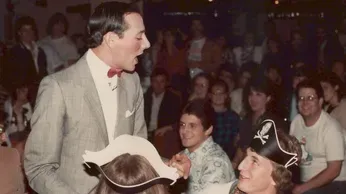
Source: HBO/Pee-wee Herman Productions, Inc.
Arguably, Reubens was right that he needed to stow his authentic self behind a larger-than-life alter-ego who can now, in retrospect, be seen as queer-coded in order to succeed in the early 1980s.
"He completely severed himself from his alter ego," Wolf reflected. "And that really worked for Paul in terms of maintaining his anonymity and also making Pee-wee a believable character."
Wolf's assessment seems intuitively correct; after all, the title of the doc is "Pee-wee As Himself," not "Paul Reubens As Himself," and whereas "Pee-wee Herman is still all but a household word (for people of a certain age, anyway), Reubens' own name is, perhaps, les recognizable.
However, Wolf noted, "that backfired when he was introduced to the world through his mugshot," and the separation between Reubens and Pee-wee worked against him.
That said, however, "I don't think it's a cautionary tale except there were sacrifices Paul made as an artist so that he could bring us his work," Wolf went on to add. "And while his work espouse values of self-acceptance, he struggled with that himself."
Those struggles are ongoing for others even now, but Wolf pointed to the way Reubens navigated a time of intense homophobia and suppression.
"'Pee-wee's Playhouse' emerged in the '80s at the height of the culture wars," Wolf noted. "Pee-eee is an anomaly that an experimental performance artist is making a children's television show with 100% creative freedom on a major network... that's remarkable. And we're obviously in the midst of an even more intense culture war.
"I think people are becoming more and more risk adverse in the media and artistically," Wolf continued. "There's a lot of self-censorship, and I think people are scared to do things that haven't been done before because of scarcity of opportunity and scarcity of job security, frankly, for people who work in the industry.
"I think Pee-wee is a beacon of risk-taking, of doing something that hasn't been done before, of building a new world," the filmmaker added. "It's becoming harder to do that in our media ecosystem, but we also are operating in times of intense censorship. So, I hope that people can cut through that and that certain innovative, determined people can still do things like what Paul did in his time."
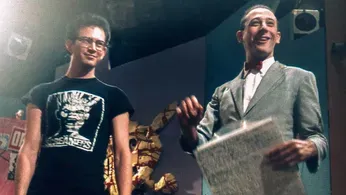
Source: HBO/Chris Casady
Reubens declined to continue after ten days of interviews, and there was some question of whether the doc would ever be finished. This twist becomes a compelling, dramatic passage in the documentary. "I showed him 45 minutes of the film, which he agreed was excellent," Wolf explained. "But there was other stuff going on behind the scenes that I was unaware of, you know: His health."
Calling Reuben's sudden detachment "devastating," Wolf recalled, "I was really, in some ways, grieving a project that I thought might not ever be released or come to fruition. And then found myself in extraordinary circumstances to finish it and understood how high the stakes were for Paul for somebody to get this right."
How that twist resolved, while surprising and gratifying, is best left unspoiled. It's safe to note, though, that for Wolf not everything was tied up in a neat bow. The filmmaker expressed his regret at not being able to ask Reubens a few more questions, among them this query, which circles back to the power dynamics between them: "Through this process of being interviewed exhaustively about your life... do you still think you were the right person to direct it, or do you think somebody else may have helped you see yourself differently?
"I would have loved to have asked him that," Wolf said. "Also, I think he had a cathartic experience related to discussing his sexuality. I was worried about re-traumatizing him to walk through the arrests, but I think he may have had a cathartics experience.
"I'll never know, and I'm sorry that I didn't have the opportunity to try to help him have that."
"Pee-wee As Himself" debuts on HBO on Friday, May 23.
Kilian Melloy serves as EDGE Media Network's Associate Arts Editor and Staff Contributor. His professional memberships include the National Lesbian & Gay Journalists Association, the Boston Online Film Critics Association, The Gay and Lesbian Entertainment Critics Association, and the Boston Theater Critics Association's Elliot Norton Awards Committee.

